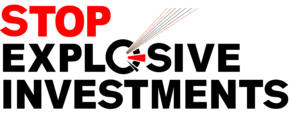Cluster bomb producer world leader for EU coin blanks
Last year, the Dutch television program Keuringsdienst van Waarde broadcasted a revealing episode that uncovered the alarming link between European mints and cluster munitions producer Poongsan. Mint companies from the EU, often state owned, buy blank coins from the South-Korean company, and turn these into (national) Euro coins. Cluster munitions however are banned by 119 countries worldwide, including 22 countries from the EU.
Poongsan is a world leader in the coin blank business, selling their product to mints worldwide. The broadcast by Keuringsdienst van Waarde and additional research by PAX reveals that the company sells or has sold coin blanks to Australia, Canada, Chile, Cyprus, the Czech Republic, Denmark, France, India, Latvia, Lithuania, the Netherlands, Norway, Peru, the Philippines, Poland, Portugal, Slovenia, Spain, South Korea, Taiwan and the United States. All these countries but India, Latvia, the Philippines, Poland, South Korea, Taiwan, South Korea and the United States have signed the CCM. Although the year in which the deals were made is unknown in many cases, at least 8 states appear to have bought coin blanks from Poongsan after they signed the CCM (Australia, Canada, France, Lithuania, the Netherlands, Norway, Portugal and Spain).
European suppliers list
In spite of its involvement with banned cluster bombs, Poongsan features on the suppliers list of the Mint Director Working Group (MDWG). The MDWG was created by the European Commission and consists (mainly) of the directors of the European mints. They maintain a list of approved suppliers for coin blanks. Poongsan is one of the companies included in this list.
Double standard by CCM countries
Buying coin blanks from a known producer of cluster munitions signals a serious double standard by CCM states. They are committed to eradicating cluster munitions for the unacceptable harm these weapons cause civilians, but yet they have done business with a company that is involved in the production of these banned weapons.
In recent years, ten countries have enacted legislation banning investment in cluster munitions, and others have issued statements that in their understanding investments are banned by the convention. Yet, Australia, Canada, the Czech Republic, France, Slovenia and Spain forgot to apply this same standard for their own policies for making money.
CCM countries must provide clarity on ties with cluster bomb manufacturer
Centre Delàs d’Estudis per la Pau, member of the international Cluster Munition Coalition, contacted the Spanish government for a reaction. Spain initially would not provide any information, and then claimed it was not familiar with the South Korean company.
But there is also good news: when confronted on air, the Royal Dutch Mint immediately professed to no longer purchase coin blanks for the production of the Dutch euro coins from Poongsan. Additionally, the Mint of Norway confirmed to PAX that it has ended its business ties with the South Korean company and will no longer source coin blanks from Poongsan as long as Poongsan is involved in the production of cluster munitions.
Doing business with a company that also produces cluster munitions not only runs counter to the spirit and purpose of the CCM, it shows an appalling double standard. The Cluster Munition Coalition therefore calls on all countries in particular States parties to the Convention on Cluster Munitions such as Australia, Canada, Chile, Cyprus, the Czech Republic, Denmark, France, Lithuania, Peru, Portugal, Slovenia and Spain to provide clarity about their relations with Poongsan. Should they not or no longer buy coin blanks from Poongsan they should publically declare what year the contract was ended, and make sure no more deals will be made in the future.
Access the press release by the CMC here.
Take action!
Find out if the mint from your country is involved with Poongsan and take action! You can access our page with campaign materials here.
